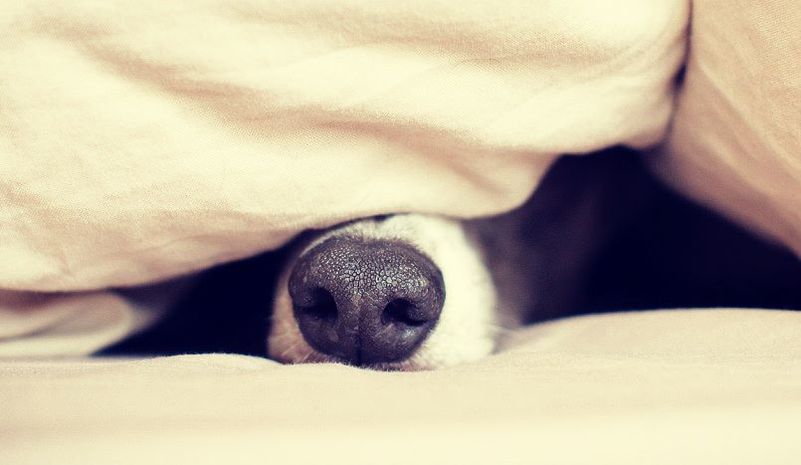|
With Independence Day right around the corner, this seemed like the perfect opportunity to discuss noise aversion and the many ways it affects our pets. Many of us have our favorite spots in town to lay under the stars and wait for the fireworks to light up the sky, but what most people fail to think of is that our pets do not comprehend these noises and lights as fireworks; most pets think that the sky is quite literally exploding and they need to find cover ASAP or simply make a run for it! The Fourth of July has the highest rate of runaway pets, more than any other day of the year! But do not fear, there are many things you can do to help ease your pets anxiety and help you both get through this holiday together.
First thing you can do to help your pet is to identify the signs of noise aversion: -trembling or shaking -hiding -following you closely -panting or drooling -pacing or acting restless -whining or barking -trying to escape or chewing on furniture, doors, or crate -submissive urinating in the home Your pet could show just one of these signs or numerous, each pet is different. Once you've identified that your pet has a noise aversion, it is time to act. Use these tips on how to help your pet lower their anxiety: 1- Anytime there is loud noise in your neighborhood (thunder, fireworks, construction, festivals) it is advised to create "white noise". That can be a TV, a radio, or even a loud fan. Anything that can help drown out the noise from outside. 2- Create a safe place for the pet. This is somewhere they can go where they feel secure. For many pets this can be their crate, for others it can be underneath an end table or in your bed. These safe places are usually small and dark to help them feel separated from the outside world. 3- When possible, stay home with the pet to help ease their stress. You are their rock and your presence can go a long way! Do not force the pet to lay with you; only hold the pet if they approach you for comfort. Forcing them to lay during their high stress could result in a bite from the pet. 4- Sometimes medication may be necessary. There are quite a few different anti-anxiety medications and like human medications, one is not always right for every pet. It is recommended you visit your veterinarian to discuss which would be right for your pet. Pets who have noise aversions are not unlike those with separation anxiety and need to be treated with care. They are sensitive and should never be punished for these behaviors. Talk to your veterinarian if these behaviors persist and/or are getting worse. Once you have identified that your pet has a noise aversion half of the battle is already won, from there you just find what works the best for the both of you. Every human-animal bond is different, so what works for your pet might be totally different from others, but that's ok your pet is just as unique as you are! So this 4th of July let us keep our pets home and safe during the fireworks!
70 Comments
|
AuthorLauren Quinn Archives
March 2020
Categories |
We operate by appointment only, please contact us via phone or online to set up a time for you and your pet!
Business Hours:
Monday 9:00 AM-5:00 PM
Tuesday 9:00 AM-5:00 PM
Wednesday 9:00 AM-12:00 PM*
(no appointments)*
Thursday 9:00 AM-5:00 PM
Friday 9:00 AM-12:00 PM
Sat & Sun Closed
|
Tel: (260)424-1689
Fax:(260)424-0700 |
|
|
|
Site powered by Weebly. Managed by IDEXX Laboratories

 RSS Feed
RSS Feed
